
Pardah or purdah is a religious and social practice of female seclusion prevalent among some Muslim and Hindu communities. It takes two forms: physical segregation of the sexes and the requirement that women cover their bodies so as to cover their skin and conceal their form. A woman who practices purdah can be referred to as pardanashin or purdahnishan. The term purdah is sometimes applied to similar practices in other parts of the world.
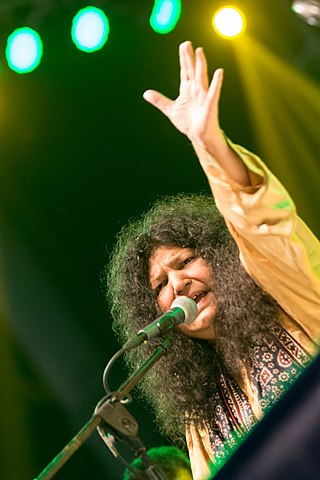
Abida Parveen is a Pakistani singer, composer and musician of Sufi music. She is also a painter and entrepreneur. Parveen is one of the highest paid singers in Pakistan. Her singing and music has earned her many accolades, and she has been dubbed as the 'Queen of Sufi music'.

BegumShaista Suhrawardy Ikramullah was a Bengali Pakistani politician from Bengal, diplomat and author. She was the first Muslim woman to earn a PhD from the University of London. She was Pakistan's ambassador to Morocco from 1964 to 1967, and was also a delegate to the United Nations.

Dina Wadia was the daughter of Muhammad Ali Jinnah, the founding father of Pakistan, and Rattanbai Petit. She belonged to the prominent Jinnah family through her father, the Petit family through her mother, and to the Wadia family through her marriage to Neville Wadia.
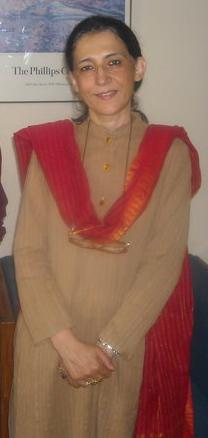
Ayesha Jalal is a Pakistani-American historian who serves as the Mary Richardson Professor of History at Tufts University, and was the recipient of the 1998 MacArthur Foundation Fellowship.

Begum Qudsia Aijaz Rasul was the only Muslim woman in the Constituent Assembly of India that drafted the Constitution of India.
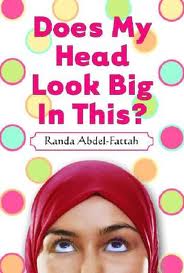
Does My Head Look Big In This? is author Randa Abdel-Fattah's first novel. It was released in Australia, by Pan MacMillan Australia, on 1 August 2005. It won the Australian Book Industry Award and Australian Book of The Year Award for older children.
Asad Amanat Ali Khan was a Pakistani classical vocalist and ghazal singer belonging to the Patiala Gharana tradition of music. In a career spanning 32 years, Khan sang over 1,000 songs for Pakistan Television and movie soundtracks, in addition to performing traditional classical music across the world. He was particularly noted for his command over the ghazal style of singing. Khan was the son of the prominent classical vocalist Ustad Amanat Ali Khan. He was awarded the highest national literary award of Pakistan, the Presidential Pride of Performance, on 23 March 2007 for his significant contributions to classical music.

Attia Hosain was a British-Indian novelist, author, writer, broadcaster, journalist and actor. She was a woman of letters and a diasporic writer. She wrote in English although her mother tongue was Urdu. She wrote the semi-autobiographical Sunlight on a Broken Column and a collection of short stories named Phoenix Fled. Her career began in England in semi-exile making a contribution to post-colonial literature. Anita Desai, Vikram Seth, Aamer Hussein and Kamila Shamsie have acknowledged her influence.
Syeda Abida Hussain–Imam is a Pakistani conservative politician, diplomat and socialite on the platform of the Pakistan Muslim League (N).

Dastaan is a Pakistani TV series based on the novel Bano by Razia Butt. Originally aired on Hum TV in 2010, it was dramatized by Samira Fazal. Based on the partition of the Indian Subcontinent and the resulting independence of Pakistan, the series takes place between 1947 and 1956. It depicts the story of Bano, a girl from a close-knit Muslim family living in Ludhiana in the pre-1947 era. The plot revolves around the trials and tribulations that she faces after she decides to dedicate her life to the All-India Muslim League.

Clear Light of Day is a novel published in 1980 by Indian novelist and three-time Booker Prize finalist Anita Desai. Set primarily in Old Delhi, the story describes the tensions in a post-partition Indian family, starting with the characters as adults and moving back into their lives throughout the course of the novel. While the primary theme is the importance of family, other predominant themes include the importance of forgiveness, the power of childhood, and the status of women, particularly their role as mothers and caretakers, in modern-day India.
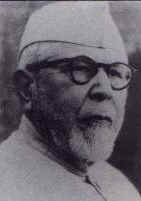
Abdul Majeed Khwaja was an Indian lawyer, educationist, social reformer and freedom fighter from Aligarh. In 1920, he along with others founded Jamia Millia Islamia and later served its vice chancellor and chancellor.

The family of Imran Khan, the former Prime Minister of Pakistan and former captain of the Pakistan cricket team, is a prominent Pakistani family active in politics and sports. It was formerly the First Family of Pakistan. Imran Khan was born on 5 October 1952 in Lahore to father Ikramullah Khan Niazi, a civil engineer, and mother Shaukat Khanum. He grew up as the only son in the family, with four sisters. Paternally, Khan belongs to the Niazi Pashtun tribe which has long been settled in Mianwali in northwestern Punjab. Khan's mother hailed from the Burki Pashtun tribe settled in Jalandhar, Punjab, which emigrated a few centuries ago from South Waziristan in the tribal areas of northwest Pakistan. Khan's maternal family has produced several great cricketers, the most prominent of whom are Javed Burki and Majid Khan.
Bibi Amtus Salam was a social worker and disciple of Mohandas Gandhi who played an active role in combating communal violence in the wake of the Partition of India and in the rehabilitation of refugees who came to India following partition.
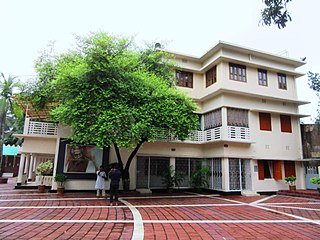
The Sheikh family of Tungipara is one of the two most prominent Bangladeshi political families, other being the Zia family. The family primarily consists of Sheikh Mujibur Rahman, Sheikh Hasina, Sheikh Rehana and their relatives. Their political involvement has traditionally revolved around the Bangladesh Awami League.
Anis Kidwai (1906–1982) was a writer, an activist and a politician from Uttar Pradesh. She worked towards peace and the rehabilitation of the victims of India's bloody partition, and spent a majority of her life in service of the newly independent India. She served two terms as a Member of the Parliament in the Rajya Sabha as a part of the Indian National Congress from 1956 to 1962.
Saba Ali Khan Pataudi is an Indian jewelry designer and mutawalli of the Auqaf-e-Shahi, established by the-then ‘Princely State’ of the Kingdom of Bhopal as a royal charitable endowment.

Shareefa Hamid Ali, also known as Begum Hamid Ali, was an Indian feminist, nationalist, advocate, and political figure. She was the President of the All India Women's Conference in 1935, and one of the founding members of the United Nations Commission on the Status of Women in 1947.
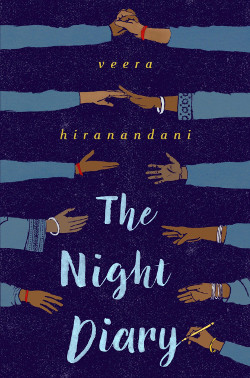
The Night Diary is a young adult novel written by American writer Veera Hiranandani and published by Penguin Random House in 2018. It is set in 1947, during the months before and after the independence of India and subsequent division with Pakistan, and is written as diary entries from the perspective of Nisha, a girl who has just celebrated her twelfth birthday along with her twin brother, Amil.















